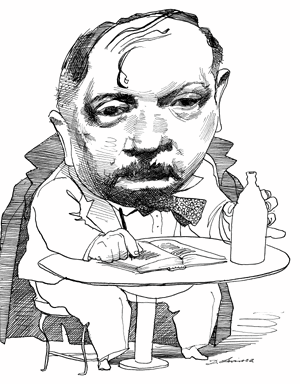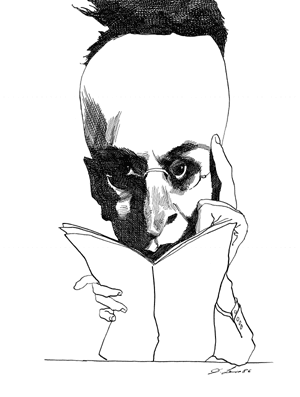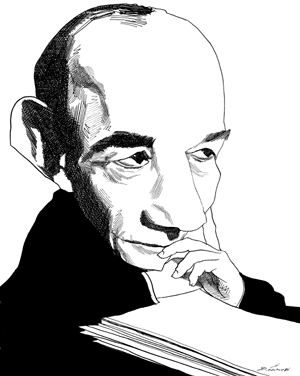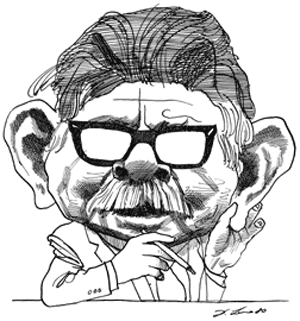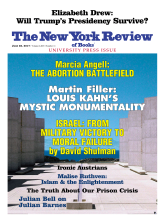Marjorie Perloff is one of America’s leading critics of poetry, having spent a long career writing on the work of avant-garde poets from Frank O’Hara to Charles Bernstein. But though she is the author of many books, she wrote in her 2004 memoir, The Vienna Paradox, “when I see [my] name in print…there is always a moment when I wonder who Marjorie Perloff is. It just doesn’t look or sound like me.” That is because, until she became a US citizen at the age of thirteen, she was called not Marjorie but Gabriele—Gabriele Mintz, the name she was born with in Vienna in 1931. Just seven years old when she came to America, Perloff can be counted as perhaps the youngest of the great wave of European Jewish intellectual refugees who immeasurably enriched American culture. On March 13, 1938, the day after Hitler’s armies marched into Austria to annex it to the Reich, the Mintz family boarded a train for Zurich, and kept moving until they had reached the Bronx, where Perloff would spend the rest of her childhood.
The dramatic metamorphosis from Gabriele to Marjorie, from haute-bourgeois Jewish Vienna to middle-class Riverdale, is the subject of Perloff’s excellent memoir. The Austria where she was born was a rump state, carved at the end of World War I from the defeated Austro-Hungarian Empire. But it retained some of the grandeur of the empire’s multinational culture. And none of the empire’s many ethnic groups—Germans, Hungarians, Czechs, Slavs—did more to create that culture, or held it in greater reverence, than its Jews. The emigration of Jews from rural villages in Galicia and other parts of Eastern Europe to the capital in Vienna had created, before World War I, an intelligentsia of amazing accomplishment, including figures like Gustav Mahler and Sigmund Freud.
As Perloff writes, Vienna’s Jews were passionate about German culture even though, or perhaps because, they were for the most part rejected as members of the German nation:
The alternative to…nationality was the Kulturnation of German Enlightenment culture—the liberal cosmopolitan ethos of Bildung [development], which had its roots in the classical Greek notion of paideia. Bildung was more than “civilization,” since…it was conceived as having a distinct spiritual dimension. Thus the cult of Kultur was gradually transformed into a kind of religion.
In her memoir, Perloff is alternately nostalgic for this religion of culture and suspicious of it. Plainly, the Viennese Jews’ enthusiasm for art and intellect did not earn them a secure place in Austrian society. On the contrary, fin-de-siècle Vienna was one of the birthplaces of political anti-Semitism, the place where the young Hitler first expressed his hatred of Jews. For all the accomplishments of the German Jews, Kultur could be seen as a kind of lullaby they sang to themselves as the walls closed in.
For a young girl trying to grow up into an American, Perloff writes, her parents’ inherited snobbery toward all things American, their nostalgia for the Vienna they had left behind, was maddening. “As a teenager, I was always hearing conversations culminating in the phrase, Dass ist doch nur Kitsch! (This is merely kitsch!),” she remembers. When Perloff “expressed my enthusiasm for Carousel,” the Rodgers and Hammerstein musical, “my mother and grandmother gave each other a look, as if to say, ‘Poor child, she doesn’t yet understand.’” In a sense, Perloff’s career as a literary critic can be seen as an attempt to bridge these two realms of taste and value, showing that American postmodern writers, though saturated in mass media and popular culture, can be as sophisticated and rewarding as the Old World modernists.
In Edge of Irony: Modernism in the Shadow of the Habsburg Empire, Perloff returns to the world of her birth. She engages in a close reading of six major post-imperial Austrian writers, making the case for the existence of a distinctive and valuable tradition of “Austro-Modernism.” Modernism, in the twenty-first century, is almost as venerable as the Renaissance. When we look for the writers who shaped our world, we are likely to name the titans who lived a hundred years ago—Woolf, Pound, Proust. As these names suggest, however, it is “French and Anglo-American Modernism,” Perloff observes, “that has been the source of our norms and paradigms for the early century.” When it comes to the German-speaking world, too, there is a whole academic industry devoted to the writers, thinkers, and artists who flourished in Weimar Germany—figures like Thomas Mann, Walter Benjamin, Bertolt Brecht, and Kurt Schwitters.
But Perloff believes that this focus on Germany has cast a shadow over the distinctively different work done by twentieth-century German-speaking writers. The poet Paul Celan was born in Czernowitz in Romania; the memoirist Elias Canetti was born in Rustchuk in Bulgaria; the novelist and journalist Joseph Roth was from Brody, which after 1918 became part of Poland. But Czernowitz and Brody were part of the Austro-Hungarian Empire (Rustchuk was under Ottoman control), and Perloff considers all three writers as belonging to a coherent Austrian tradition. She reads them alongside three other writers closely associated with Vienna: the satirist Karl Kraus, the philosopher Ludwig Wittgenstein, and Robert Musil, the only one of the six who was not Jewish.
Advertisement
It is a disparate group, but Perloff believes they share a certain sensibility, a way of thinking and feeling, that can be traced to their situation as legatees of a vanished empire. Modernism is usually thought of as being radical in all directions; whether they were politically revolutionary or reactionary, modernist thinkers strove for a new beginning in art and culture. “The essential elements of our poetry will be courage, audacity and revolt,” announced F.T. Marinetti’s Futurist Manifesto in 1909. For the Austro-Modernists, by contrast, the dominant spirit was irony, as Perloff explains:
Its hallmark [was] a profound skepticism about the power of government—any government or, for that matter, economic system—to reform human life. In Austro-Modernist fiction and poetry, irony—an irony less linked to satire (which posits the possibility for reform) than to a sense of the absurd—is thus the dominant mode. The writer’s situation is perceived not as a mandate for change…but as an urgent opportunity for probing analysis of fundamental desires and principles.
This preference for diagnosis over prescription, for retrospection over renovation, is so far from what we usually think of as modernism that it may not seem to deserve the name. But in her case studies, Perloff argues convincingly that post–World War I Austro-Hungarian literature—a literature named after a country that had ceased to exist—did share fundamental elements with the wider modernist project. The preference for fragments over wholes, the resistance to “closure,” the dissolving power of analysis—these qualities, which we find in Eliot’s “The Waste Land” or Pound’s Cantos, Perloff also locates in works ranging from Wittgenstein’s Philosophical Investigations to Kraus’s epic satirical play The Last Days of Mankind. The difference is that, while Eliot and Pound put their faith in various reactionary doctrines to repair the damage of the twentieth century, the Austro-Modernists remained poised in skepticism. To use a word that Perloff avoids, there is something liberal—in the sense of anti-utopian, anti-ideological—about these writers.
This skepticism about ideology appears to be an echt-Austrian quality, which developed over the course of the long reign of Emperor Franz Josef, from 1848 to 1916. During this period, the rise of nationalism in Eastern Europe and of Prussian military power robbed the Austro-Hungarian Empire of its raison d’être. The empire satisfied neither the militant pan-Germans, who looked to Prussia for leadership, nor the other ethnicities living under Habsburg rule, who yearned for independence. All that was holding the empire together, it came to seem, was the personal authority of Franz Josef, who was revered as the symbol of a continuity everyone knew was on its last legs.
For writers looking back on this long Indian summer of empire, from the vantage point of post-1918 anarchy, it was the very mildness of this ruling principle—its tolerance, even its slovenliness—that inspired nostalgia. This was especially true for Jewish writers who found themselves in successor states where anti-Semitism flourished, and who remembered the monarchy as a bulwark that had once held anti-Jewish hatred at bay.
One of the greatest elegies for the empire came from Robert Musil, who was born in 1880 and raised in Bohemia. In his unfinished novel, The Man Without Qualities, which is set in Vienna in 1913, Musil evoked the atmosphere of resigned mediocrity that sustained the empire he called “Kakania.” The name is a double pun. It evokes the phrase kaiserlich und königlich, “imperial and royal,” which was affixed to the empire’s institutions, since Franz Josef—in a typically Austrian compromise—reigned as both emperor of Austria and king of Hungary. But it also puns on the word “kaka,” which in German as in English is a childish name for excrement.
The eighth chapter of the first book of The Man Without Qualities is Musil’s ode to Vienna’s mixed-up, ridiculous, but curiously resilient regime. Musil writes:
By its constitution it was liberal, but its system of government was clerical. The system of government was clerical, but the general attitude to life was liberal. Before the law all citizens were equal, but not everyone, of course, was a citizen. There was a parliament, which made such vigorous use of its liberty that it was usually kept shut; but there was also an emergency powers act by means of which it was possible to manage without Parliament, and every time when everyone was just beginning to rejoice in absolutism, the Crown decreed that there must now again be a return to parliamentary government.
To Musil, all this confusion left Franz Josef’s subjects “negatively free,” and he concludes that “Kakania was perhaps a home for genius after all; and that, probably, was the ruin of it.” Certainly his own novel is a portrait of genius—in the shape of Ulrich, the titular man without qualities—that can find no expression, no worthy aim, no intellectual or spiritual discipline. What Ulrich finds instead is a job with the Parallel Campaign, an initiative to celebrate the seventieth year of Franz Josef’s reign, in 1918.
Advertisement
Of course the reader knows, as the characters do not, that the emperor will die before that anniversary, and so will the empire. The whole campaign is an exercise in hubris and blindness, accentuated by the fact that no one involved can actually define what they intend to accomplish. All they can do is rhapsodize: “Their goal must stir the heart of the world. It must not be merely practical, it must be sheer poetry…. It must be a mirror for the world to gaze into and blush.”
The Austrian idea is empty, but at least it is not menacing. The same can’t be said of another character, Hans Sepp, whom Perloff sees as a representative of the fascism that would triumph after the war. Sepp, Musil writes, was part of a “Christian-German circle” that opposed “‘the Jewish mind,’ by which they meant capitalism and socialism, science, reason, parental authority and parental arrogance, calculation, psychology, and skepticism.” Musil, writing his novel in the 1920s—the first two parts were published in 1930 and 1933—could already see that this kind of all-too-definite ideology had triumphed over Kakanian “negative freedom.” Musil himself, like the Mintz family, had to flee Austria after the Anschluss—among other things, he was vulnerable because he had a Jewish wife—and he died in penury and obscurity in Switzerland in 1942.
A similarly grim end was in store for Joseph Roth, whose The Radetzky March is the other major novelistic elegy to the vanished empire. This book too, in Perloff’s words, “tracks the dissolution of a particular complex of values—values in many ways absurd and regressive, but benign in comparison to the political climate of post–World War I Europe.” The story concerns three generations of the Trottas, a family elevated to the nobility when the grandfather, an ordinary peasant turned soldier, saves the life of Franz Josef at the Battle of Solferino. The grandson, Carl Joseph von Trotta, is an officer in the imperial army on the eve of World War I, where he too experiences the breakdown of traditional martial and aristocratic values. Perloff emphasizes that this is above all a breakdown of language: “Words—the official words and state dogma—can no longer control actions.”
Language was inevitably a central issue for writers in a polity that was riven along linguistic lines, and it is one of the recurring themes of Edge of Irony. Karl Kraus, the arch-satirist of imperial and post-imperial Vienna, edited a one-man journal, Die Fackel, whose major purpose was to expose and denounce journalistic clichés. Perloff’s chapter on Kraus focuses on The Last Days of Mankind, his immense antiwar drama, which he worked on throughout World War I and completed in 1922.
The work is unperformably long: as Kraus himself wrote, “the performance of this play, which according to terrestrial measurement of time would encompass about ten evenings, is intended for theater on Mars.” Rather than a script, Perloff thinks of it as “hypertextual,” an assemblage of “newspaper dispatches, editorials, public proclamations, minutes of political meetings, or manifestos, letters, picture postcards, and interviews—indeed, whatever constituted the written record of the World War I years.” In this way, Kraus anticipates today’s conceptual poets, such as Kenneth Goldsmith—a writer much admired by Perloff—whose work consists largely of transcriptions. (Goldsmith once led a project called Printing Out the Internet, which attempted to do just that; it’s easy to imagine Kraus admiring this impossible dream.)
Kraus famously referred to Vienna as a “proving ground for the destruction of the world,” and in The Last Days of Mankind he showed that the first stage in this process was the destruction of language. In one scene, Kraus mocks the wartime vogue for banning German words of foreign origin by having a character deliver a speech on behalf of “the provisional Central Commission of the Executive Committee of the League for the General Boycott of Foreign Words”—a speech that, Perloff observes, is “a tissue of foreign phrases,” including the word “boycott” itself.
In another scene, he has two characters discuss the proliferation of wartime rumors, in a dialogue where the word “rumor” appears thirty times, reducing language to nonsense: “The rumor going around in Vienna is that there are rumors going around in Austria,” and so on. Kraus’s emphasis on language might seem excessive until one remembers the euphemisms coined by the Nazis to conceal their crimes—proof that the corruption of language is indeed indispensable to the corruption of human beings.
The issue of language unites post-imperial writers as different as Elias Canetti, known mainly for his study Crowds and Power and his memoirs, and the poet Paul Celan. Perloff observes that, in describing his own childhood, Canetti makes much of the continual changes of language to which he was subject. Born in a Sephardic Jewish community in Bulgaria, he grew up speaking Ladino at home and Bulgarian to his neighbors; meanwhile his parents spoke German to each other, and a move to England brought English into his repertoire as well. Not until he turned eight and the family moved to Vienna did German become his “mother tongue.” But can a mother tongue acquired so late really be called native speech? Perloff argues that Canetti’s own prose “is the language of the always already translated,” as if “he intuitively looked for words and syntactic constructions that would ‘go’ in the other language.” In this sense, cosmopolitanism is a kind of dispossession.
If Perloff finds Canetti’s language insufficiently knotty and idiosyncratic, the same certainly can’t be said for Celan, one of the most difficult poets of the twentieth century. With Celan, she writes, “irony is carried to its logical conclusion, which is to say, a refusal to define, to assert, to take a stand,” even when it comes to matters of simple denotation. Perloff focuses particularly on the love poems Celan wrote to the Austrian poet Ingeborg Bachmann, in which “the scene of encounter tends to be abstract.” “White and Light,” for instance, reads in part: “White,/what moves us./without weight/what we exchange/white and light:/let it drift.” There is eroticism in these lines, a sense of something intimately shared. But there is also a profound sense of disconnection, Perloff observes: “The love proffered here is intense but hardly a source of joy,” partly because the world of the poem is abstract and underpopulated, a place where “no one else exists but the lovers.” Language, in Celan’s verse, often seems to have broken away from the world altogether, becoming almost a self-referential medium.
This pessimism about the power of language to communicate and refer may be the most important marker of Austro-Modernism. Kraus’s aggressive burlesque of journalism and slang, Roth’s melancholic mockery of the codes of chivalry and military honor, Canetti’s sense of being permanently lost in translation—in various ways, all of Perloff’s subjects seem to be in mourning not just for an empire and a way of life, but for the transparency and meaningfulness of language itself. As Austrians and, in many cases, as Jews, these writers had a unique vantage point on the crisis of language that was to become so central to modernism in all its guises. The edge of irony, Perloff shows, was an uncomfortable place to live, but a fruitful place to write from.


